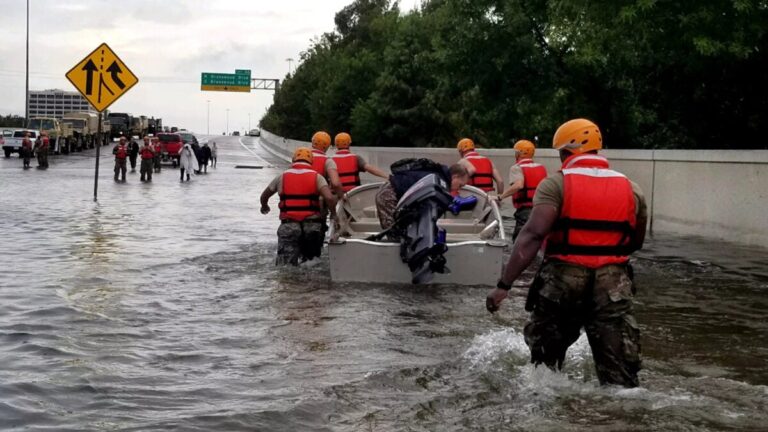When Superstorm Sandy made a beeline for New York Metropolis in October 2012, it flooded enormous swaths of downtown Manhattan, leaving 2 million people with out electrical energy and warmth and damaging tens of thousands of properties. The storm adopted a sweltering summer time in New York Metropolis, with a procession of warmth waves nearing 100 degrees.
For many who have been pregnant on the time, enduring these excessive circumstances wasn’t simply uncomfortable—it could have left a long-lasting imprint on their youngsters’s brains. That’s in line with a brand new research revealed on Wednesday within the peer-reviewed journal PLOS One. Utilizing MRI scans, researchers at Queens School, Metropolis College of New York, discovered that youngsters whose moms lived by way of Superstorm Sandy had distinct mind variations that would hinder their emotional improvement. The results have been much more dramatic when individuals have been uncovered to excessive warmth throughout their being pregnant, along with the tropical storm, the researchers discovered.
“It’s not only one local weather stressor or one remoted occasion, however relatively a mix of all the pieces,” stated Donato DeIngeniis, the lead writer of the research and a doctoral pupil in neuropsychology on the CUNY Graduate Middle. DeIngeniis’ research is the primary of its type to look at the joint results of pure disasters and excessive warmth—occasions that usually coincide. A number of years in the past, scientists dubbed summer time “danger season” because it’s a time of colliding dangers, together with warmth, hurricanes, wildfires, and poisonous smoke. And summertime temperatures hold climbing to new heights.
The research analyzed mind imaging knowledge from a bunch of 34 youngsters, roughly 8 years outdated, whose moms have been pregnant throughout Superstorm Sandy—a few of whom have been pregnant on the time that Sandy made landfall, and a few of whom have been uncovered to warmth 95 levels F or larger throughout their being pregnant. Whereas the researchers didn’t discover that warmth alone had a lot of an influence, dwelling by way of Superstorm Sandy led to a rise within the basal ganglia’s quantity, part of the mind that offers with regulating feelings.
Whereas that bigger dimension might be a compensation in response to emphasize, adjustments within the basal ganglia have been linked to behavioral challenges for kids, comparable to depression and autism, DeIngeniis stated.
“What we’re seeing is compelling proof that the local weather disaster is not only an environmental emergency, it’s probably a neurological one with consequence for future generations who will inherit our planet,” stated Duke Shereen, a co-author of the research and the director of the MRI facility at CUNY Graduate Middle, in a press launch. World warming made Superstorm Sandy extra damaging on account of rising sea levels and better ocean temperatures which may have amped up its rainfall.
Yoko Nomura, a co-author of the research and a psychology professor on the Queens School, CUNY, stated that the time earlier than beginning is “very, very delicate” for improvement as a result of the fetus’ physique is altering so drastically. The human mind grows probably the most quickly within the womb, reaching greater than a 3rd of its full grownup quantity earlier than beginning, in line with the research. Any added stress at the moment, even when small, “can have a a lot larger influence,” Nomura stated.
However that extra-sensitive interval additionally presents a window of alternative. “Developmental science, together with the science on this paper, is thrilling as a result of it not solely tells us what we are able to do to guard youngsters from the consequences of local weather change, however it additionally tells us when we are able to step in to guard youngsters to make the best distinction,” Lindsey Burghardt, chief science officer on the Middle on the Growing Youngster at Harvard College, stated in an e mail.
Though there’s a number of proof that prenatal stress usually can have an effect on youngster mind improvement, in line with DeIngeniis, analysis on climate-related stress particularly is missing. “It’s nonetheless a subject that has potential for explosive development,” stated Jennifer Barkin, a professor at Mercer College Faculty of Medication in Macon, Georgia, who’s finding out the consequences of final 12 months’s Hurricane Helene on maternal well being.
DeIngeniis’ research affords concrete proof of how climate-charged occasions can have an effect on the mind, Barkin stated. “Folks have a tough time typically with psychological well being, as a result of it’s not like you may take an X-ray and see a damaged bone.” But it surely’s simpler to know imaging exhibiting a distinction in mind quantity based mostly on publicity to environmental stress, she stated.
Barkin, who developed an index for measuring maternal well being after childbirth, says that persons are starting to pay extra consideration to moms and their psychological well being—not simply when it comes to delivering a wholesome child, however over the long run. “We are inclined to focus issues on the kid’s final result, which is vital, however to maintain the kid wholesome, the mom must be wholesome, too,” she stated. “As a result of when Mother’s struggling, the household’s going to battle.”
This text initially appeared in Grist at https://grist.org/health/climate-disaster-baby-research-brain-development/. Grist is a nonprofit, unbiased media group devoted to telling tales of local weather options and a simply future. Study extra at Grist.org.

